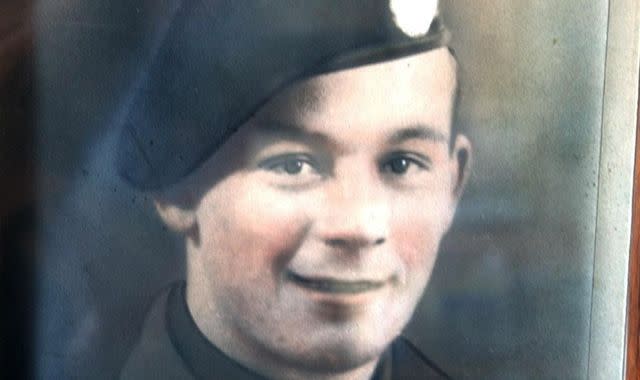The legacy of the Mad Piper who played bagpipes on D-Day beaches

Amid the roar of gunfire and the shouts and screams of soldiers as they ran up the beaches of Normandy, there was another sound: the keening cry of bagpipes.
The noise of war was everywhere. Explosions rent the air at every moment, the rattle of machine guns firing down at Allied troops rang out along 50 miles of coastline.
Bill Millin was just 21 years old when he stepped off his landing craft on D-Day, wearing his father's First World War kilt and armed only with a ceremonial dagger.
In the hell of war, the trill of his bagpipes raised morale and was an echo of home for his comrades on that fateful day.
By some miracle - and perhaps the fact that German snipers would later say they avoided shooting him because they thought he had gone mad - Bill survived D-Day and his story became legend.
"The life I live is because of my grandfather's generation," his grandson Jacob Millin says.
Follow live: Russia snubbed by D-Day anniversary event - as Biden touches down
He plays bagpipes too, like his father and his grandfather before him.
"It makes you feel connected, like I'm doing something to keep the story going, keeping it alive," he adds.
"It's down to my generation and future generations to not let it fade."
It may be a common sight in Scotland, where his grandfather hails from, but bagpipes are a bit more exotic in Norfolk, where Jacob lives with his family.
"Whenever you play, people do wander over because you don't hear it very often. It's quite an individual instrument and they're so loud you can hear them from miles away."
Read more on D-Day:
How a framed photo of veteran's wife saved his life
The 21-year-old's weather report that changed the course of history
It was against the rules to play the bagpipes on D-Day. Military bosses were worried about the level of casualties at the landings.
In 1944, Bill was the personal piper to the eccentric Lord Lovat, the commander of the newly formed 1st Special Service Brigade which landed at Sword beach on 6 June 1944. It was Lovat who asked him to play the pipes on the beach.
When Bill reminded him of the rules, the peer replied: "Ah, but that's the English War Office. You and I are both Scottish, and that doesn't apply."
And so The Road To The Isles, a tune about the hills of Skye, rang out in France.
Bill returned to Normandy for key commemorations and in 1994 was reunited with Josette Gouellain in the town of Ranville.
Fifty years earlier, Josette, then a little girl, had asked him to play her a tune and he obliged with The Nut Brown Maiden in reference to the colour of her hair and eyes.
In 1995, he played the lament at Lord Lovat's funeral. Bill died in 2010.
In Jacob's work as a teacher, he gets to pass on the stories of D-Day to his students so that a new generation can engage with what happened, even as the event passes out of living memory.
"For them, looking at old people, they might be a bit slower or not as quick, but actually some of the people they walk past in the streets were actual veterans who have seen active service or were involved in codebreaking," he says.
"I can't imagine when I was 21 being on the beach with people shooting and seeing my friends die in front of me."
👉 Click to subscribe to the Sky News Daily wherever you get your podcasts 👈
This generation, he says, often don't know what to do when they're in their 20s.
"Being deployed on D-Day and having to carry that with you for the rest of your life, I think that's a really important message of not giving up, being humble about things and doing what needs to be done."
Jacob, who regularly tours playing his bagpipes at memorial events, says his young son has also taken up the bagpipes.
The legacy of the Mad Piper lives on.


